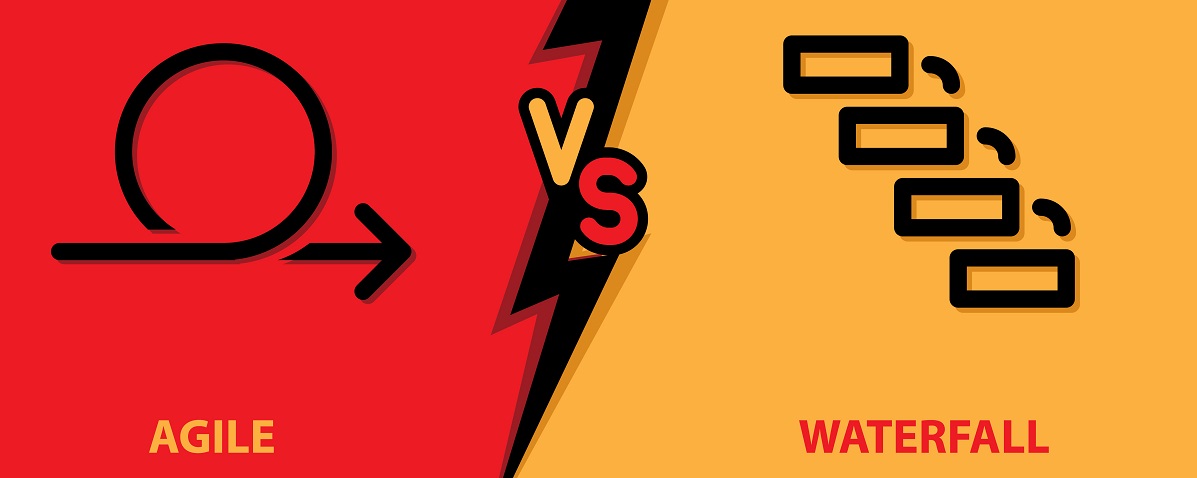
BE THE FIRST TO KNOW
Subscribe to the SPOCE newsletter to receive timely updates about new courses, venues and discounts!

Imagine a waterfall gushing off the edge of a cliff. That is the analogy project managers have been using for many years to describe the linear methodology. It follows a singular path being a straight forward sequential approach, where each phase flows naturally into the next. The project progresses through stages such as feasibility study, design, implementation, testing, and deployment. Once a phase is completed, you shouldn’t be returning to it.
One of the strengths of the Waterfall model lies in its’ predictability and sturdiness. Project requirements are well-defined upfront, allowing for precise planning and budgeting. It is an ideal model for projects where the scope is clear and changes are expected to be minimal.
However, the rigidity of Waterfall can also be its’ greatest weakness. Any changes or unexpected issues that arise in the project can be costly and time-consuming to address. This can massively increase the risk of delivering a product that doesn’t fully meet user needs, or perhaps even deliver a product late.
Contrast this previous approach with Agile, a modern methodology designed to be responsive to change. Agile breaks the project down into smaller increments called sprints. Each sprint / iteration typically lasts from one to four weeks and results in a potentially acceptable product.
Agile, at its’ core, is about collaboration. Cross-functional teams work extremely close together, constantly communicating and aiming to deliver value quickly and effectively. Customer feedback is prioritized, allowing for continuous improvement and adaptation to evolving requirements. Product owners, product backlogs, reviews and retrospectives are all in play to make an agile project a success.
Agile embraces change rather than resisting it, making it well-suited for projects with high levels of uncertainty or fast changing environments. By delivering working products early and often, Agile enables stakeholders to see progress firsthand and provide feedback throughout the development process.
Simply, it depends. It depends on the specific context of your project. It depends on your product. It depends on your host organisation. It depends on your capabilities.
In essence, projects where requirements are well-understood and unlikely to change, Waterfall may offer a straightforward path to success. Its’ linear nature and emphasis on upfront planning make it suitable for projects with fixed budgets and timelines.
On the flip side, Agile thrives in scenarios where flexibility and responsiveness are of vital importance. If you’re working on a project where requirements are subject to change, or if you need to deliver value quickly in a dynamic environment, Agile may be the way to go.
In reality, project management doesn’t have a “one size fits all” approach therefore many projects don’t fit neatly into either the Agile or Waterfall categories in full. A hybrid approach combines elements of both methodologies to tailor the process to the specific needs of the project. In my team we refer to this as “taking the best elements of both methodologies to make the greatest approach possible.”
Whether you choose the structured predictability of Waterfall or the adaptive flexibility of Agile, project success is always the main goal. Continue to improve, innovate and explore, learn from mistakes and patch gaps or cracks that may appear for a more robust delivery of products time and time again. You can learn more about how achieve project success on one of my courses! We break down what success looks like, how we achieve this, and how we measure this. For information on when you can join me next, call 0800 151 0140 to discuss dates, courses and more.
Having worked in the industry since 2016, Harley’s experience is vast and knowledge of project management methods is of an elite standard. He has covered a wide variety of roles in a plethora of projects and has worked with some incredible project professionals over the years; there is seldom a scenario that Harley has not encountered.
Residing in Poole, Dorset Harley has specialized in maritime projects and programmes in and around the stunning natural harbour. From project managing major yachting events, to advising on risk management approaches, the natural elements have thrown endless challenges into projects where Harley has strategically extracted the best outcomes from each scenario. These tales make up some of Harley’s most interesting examples used when delivering his training of which attendees enjoy.
SPOCE is proud to have industry leading pass rates for delegates in the PRINCE2® and APM methods which Harley has played a vital part in achieving. Starting his training career in 2019, he would run sessions such as “what makes the perfect business case?” and the much loved “PRINCE2 Practitioner exam workshops”.
Click here for 2024 PRINCE2 7 courses
Click here for AgilePM courses
Click here for PRINCE2 Agile courses
Comments